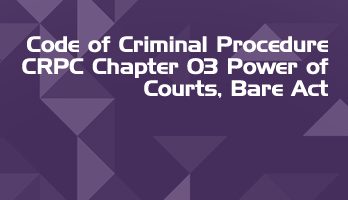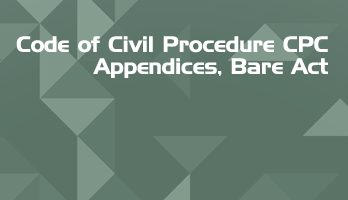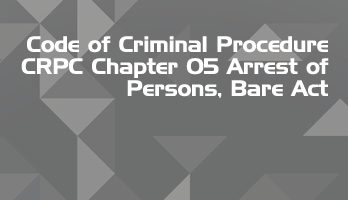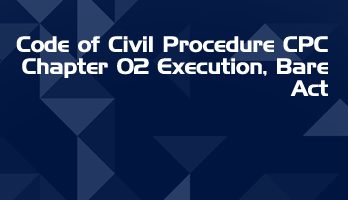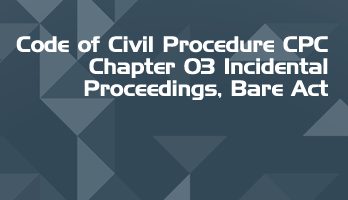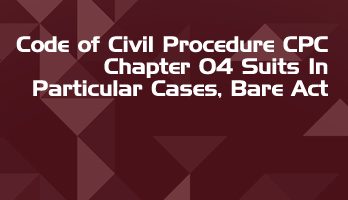A 'Bare act' is the actual legislation passed by the Parliament of India. Generally, an act sets out the high level legal and policy principles applicable to the subject matter of the law.
Most acts are accompanied by 'subsidiary legislation' such as rules, regulations, notifications and orders; which address the actual implementation detail of the act.
Free Full Course Available on LawMint's YouTube Channel
How to Land Your Dream LLB Internship in a Top Law Firm
- Part 1 - Introduction
- Part 2 - Internship Planning
- Part 3 - Internship Research
- Part 4 - Building Your Profile
- Part 5 - The Email
- Part 6 - The Resume
- Part 7 - The Cover Letter
- Part 8 - The Interview
- Part 9 - Self Development
Practical and comprehensive course, with real examples and step-by-step analysis of the complete internship application process. Check out LawMint's YouTube channel now!
Code of Criminal Procedure, 1973
Chapter 15 – Complaints To Magistrates
Section 200 – Examination of complainant
A Magistrate taking cognizance of an offence on complaint shall examine upon oath the complainant and the witnesses present, if any, and the substance of such examination shall be reduced to writing and shall be signed by the complainant and the witnesses, and also by the Magistrate: Provided that, when the complaint is made in writing, the Magistrate need not examine the complainant and the witnesses,
- if a public servant acting or purporting to act in the discharge of his official duties or a Court has made the complaint; or
- if the Magistrate makes over the case for inquiry or trial to another Magistrate under section 192: Provided further that if the Magistrate makes over the case to another Magistrate under section 192 after examining the complainant and the witnesses, the latter Magistrate need not re – examine them.
Section 201 – Procedure by Magistrate not competent to take cognizance of the case
If the complaint is made to a Magistrate who is not competent to take cognizance of the offence he shall,
- if the complaint is in writing, return it for presentation to the proper Court with an endorsement to that effect;
- if the complaint is not in writing, direct the complainant to the proper Court.
Section 202 – Postponement of issue of process
- Any Magistrate, on receipt of a complaint of an offence of which he is authorised to take cognizance or which has been made over to him under section 192, may, if he thinks fit and shall in a case where the accused is residing at a place beyond the area in which he exercises his jurisdiction, postpone the issue of process against the accused, and either inquire into the case himself or direct an investigation to be made by a police officer or by such other person as he thinks fit, for the purpose of deciding whether or not there is sufficient ground for proceeding: Provided that no such direction for investigation shall be made –
- where it appears to the Magistrate that the offence complained of is triable exclusively by the Court of Sessions; or
- where the complaint has not been made by a Court, unless the complainant and the witnesses present (if any) have been examined on oath under section 200.
- In an inquiry under Sub – Section (1), the Magistrate may, if he thinks fit, take evidence of witness on oath: Provided that if it appears to the Magistrate that the offence complained of is triable exclusively by the Court of Session, he shall call upon the complainant to produce all his witnesses and examine them on oath.
- If an investigation under Sub – Section (1) is made by a person not being a police officer, he shall have for that investigation all the powers conferred by this Code on an officer in charge of a police station except the power to arrest without warrant.
Section 203 – Dismissal of complaint
If, after considering the statements on oath (if any) of the complainant and of the witnesses and the result of the inquiry or investigation (if any) under section 202, the Magistrate is of opinion that there is no sufficient ground for proceeding, he shall dismiss the complaint, and in every such case he shall briefly record his reasons for so doing.
Important Central Acts in Regional Languages
Legislative department website also features regional language versions of several important Central Acts.
Free Full Course Available on LawMint's YouTube Channel
How to Land Your Dream LLB Internship in a Top Law Firm
- Part 1 - Introduction
- Part 2 - Internship Planning
- Part 3 - Internship Research
- Part 4 - Building Your Profile
- Part 5 - The Email
- Part 6 - The Resume
- Part 7 - The Cover Letter
- Part 8 - The Interview
- Part 9 - Self Development
Practical and comprehensive course, with real examples and step-by-step analysis of the complete internship application process. Check out LawMint's YouTube channel now!





